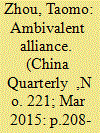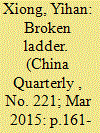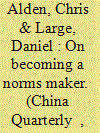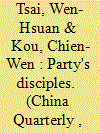|
|
|
Sort Order |
|
|
|
Items / Page
|
|
|
|
|
|
|
| Srl | Item |
| 1 |
ID:
139552


|
|
|
|
|
| Summary/Abstract |
From 1960 until 1965, the People's Republic of China (PRC) built a remarkably cordial quasi alliance with the Republic of Indonesia. At the same time, however, the years between 1960 and 1965 were marked by two large waves of anti-Chinese movements in Indonesia. Although more than half a century has passed since these events, our understanding of Chinese foreign policy towards Indonesia during these turbulent years remains incomplete. In 2008, the Chinese Foreign Ministry Archives declassified for the first time documents produced during the years between 1961 and 1965. However, very recently in summer 2013, the Chinese Foreign Ministry Archives re-classified the main body of its collection. Through examining this body of fresh but currently inaccessible official records, this article aims to bridge the gap between scholarly works on the PRC's diplomatic history and overseas Chinese history. By tracing the processes by which Chinese diplomats dealt with Sukarno, the ethnic Chinese in Indonesia, and the Communist Party of Indonesia (Partai Komunis Indonesia, or the PKI), this article argues that the ambivalent Chinese alliance with Indonesia was shaped by three disparate pressures which interacted and competed with one another: the strategic need to befriend Third World countries, ethnic ties to the Chinese in Indonesia and ideological commitment to the international communist movement.
|
|
|
|
|
|
|
|
|
|
|
|
|
|
|
|
| 2 |
ID:
139550


|
|
|
|
|
| Summary/Abstract |
This paper attempts to explain why education fails to facilitate upward mobility for migrant children in China. By comparing a public school and a private migrant school in Shanghai, two mechanisms are found to underpin the reproduction of the class system: the ceiling effect, which is at work in public schools, and the counter-school culture, which prevails in private migrant schools. Both mechanisms might be understood as adaptations to the external circumstances of – and institutional discrimination against – migrants rather than as resistance to the prevailing institutional systems. Thus, the functioning of these mechanisms further strengthens the inequality embodied in the system.
|
|
|
|
|
|
|
|
|
|
|
|
|
|
|
|
| 3 |
ID:
139547


|
|
|
|
|
| Summary/Abstract |
This article uses an institutional approach to examine Chinese NGOs as an emerging organizational field. In mature organizational fields, the organizations are powerfully constrained to follow the institutional practices of that field. However, in an emerging organizational field, the institutionalized constraints are not yet established, so actors can try out a wide range of practices. Some of these practices will become the new “rules of the game” of the organizational field when it is established. The content of these rules will shape the relationship between NGOs and the Chinese party-state for future generations. We find that a Chinese NGO's resource strategy is shaped by two interacting factors. First, NGOs operate in an evolving ecology of opportunity. Second, the social entrepreneurs who lead Chinese NGOs perceive that ecology of opportunity through the lens of their personal experiences, beliefs and expertise. As a result, the initial strategies of the organizations in our sample were strongly influenced by the institutional experience of their founders. Former state bureaucrats built NGOs around alliances with party-state agencies. In contrast, NGO founders that had no party-state experience usually avoided the state and sought areas away from government control/attention, such as the internet or private business.
|
|
|
|
|
|
|
|
|
|
|
|
|
|
|
|
| 4 |
ID:
139549


|
|
|
|
|
| Summary/Abstract |
By shedding light on the concept of the fangnu (mortgage slave), this paper explains why young men from China migrate to Ethiopia. Young, educated, employed and ambitious, the fangnu is a modern type of slave who is said to have sold his freedom to the bank for the purpose of buying a house. For young men coming from a rural background, temporary migration offers a chance to earn the money so badly needed for a down payment or repayments on mortgage loans for their newly bought residential property. I argue that the fangnu is the child of a Chinese society characterized by high social mobility as well as a growing demographic imbalance owing to the one-child policy. In this context, a house – or in urban China, commonly an apartment in a high-rise building – is increasingly seen as a marker of status, especially in the marriage market. Although the Chinese do not demand a bride price, the hunfang (marriage house) has become the norm in urban Chinese society. Unable to rely on the financial support of their kin, young Chinese men from the countryside migrate to earn the starting capital needed to cope with the socio-economic pressures of settling in the city.
|
|
|
|
|
|
|
|
|
|
|
|
|
|
|
|
| 5 |
ID:
139548


|
|
|
|
|
| Summary/Abstract |
This article explores China's engagement with the development of norms on security in Africa, with particular attention to its changing post-conflict engagement. Applying the gradualism characteristic of its approach to policy formulation and implementation, the Chinese policymaking community is playing a key role in seeking to redefine the contemporary international approach to managing African security dilemmas. By reinterpreting concepts such as liberal peacebuilding, Chinese policymakers have begun a process of reframing established norms on security and development that are more in line with its principles and core interests. This agenda in the making has enabled the Chinese government to move beyond the constraints of a rhetoric rooted in non-interference in domestic affairs that prohibited involvement in African security issues to a set of practices that allows China to play a more substantive role in security on the continent.
|
|
|
|
|
|
|
|
|
|
|
|
|
|
|
|
| 6 |
ID:
139543


|
|
|
|
|
| Summary/Abstract |
This article discusses the origin and consolidation of the Chinese Communist Party (CCP) reserve cadre system and considers its impact on the resilience and perpetuation of the Party's authoritarian regime. Reserve cadres are essentially the Party's “disciples”; through careful selection and training, the CCP is able to build a legion of youthful political elites with exceptional administrative ability and correct political thinking. Upon assumption of Party and government posts, these reserve cadres are able to reinforce the Party's autonomy and resist outside pressures to democratize, thereby manifesting the very nature of a resilient authoritarian regime.
|
|
|
|
|
|
|
|
|
|
|
|
|
|
|
|
| 7 |
ID:
139544


|
|
|
|
|
| Summary/Abstract |
The growth of Chinese multinational enterprises (MNE) has stimulated great interest in their outward foreign direct investment (FDI) strategies, particularly among academics in business and management studies. To date, however, serious methodological shortcomings plague empirical studies in these disciplines. Specifically, the vital issue of how Chinese MNEs use and route FDI via tax havens and offshore financial centres is not adequately dealt with. These practices have created large geographical, industrial composition and volume biases in Chinese outward FDI data. Using a sample of 100 Chinese MNEs, we illustrate how the use of tax havens and offshore financial centres has created these biases, and examine the implications for understanding Chinese MNE activity.
|
|
|
|
|
|
|
|
|
|
|
|
|
|
|
|
| 8 |
ID:
139545


|
|
|
|
|
| Summary/Abstract |
Countries endowed with rich natural resources such as fuels and minerals often fall behind in human development. Does resource endowment hamper human capital development in China, a country that hosts rich resources in many of its regions? Through cross-regional and longitudinal statistical analysis and field research in selected mining areas, this study finds that resource dependence reduces government expenditure on human capital-enhancing public goods including education and health care. The local economic structure and reduced demand for labour, the shifting of government responsibilities onto mining enterprises, and the myopia of local residents and officials all discourage the local governments in resource-rich regions from investing in human capital.
|
|
|
|
|
|
|
|
|
|
|
|
|
|
|
|
| 9 |
ID:
139546


|
|
|
|
|
| Summary/Abstract |
This study estimates the extent of subsidization in the ten provinces of western China from 1990 to 2012 with the aim of highlighting the exceptionality of the Tibet Autonomous Region (TAR) leading up to and following the widespread Tibetan protests that swept through four Chinese provinces in 2008. Although the Tibet development model was criticized by many Chinese economists in the 1980s and 1990s for being highly subsidy-dependent and inefficient, these aspects of dependence and inefficiency were exacerbated even further under the Hu–Wen administration, particularly following the 2008 protests. While subsidies and investment also increased in other western provinces, the exceptionality of the TAR stands out in terms of the levels of subsidization attained, the sheer disassociation of these subsidies from changes in the local productive economy, and the degree to which ownership in the local economy has come to be dominated by external interests. The recent phase of intensive subsidization has thereby exacerbated the dependence of local Tibetan livelihoods on these state strategies, while at the same time intensified the state-led economic integration of the region into the rest of China through externalized patterns of ownership and consolidated state control. Arguments that the resultant inefficiencies and social tensions are owing to a marketization of social relations or to cultural insensitivity and lack of adaptation to local circumstances de-emphasize the central role of the state in shaping the deeply structural character of these transformations.
|
|
|
|
|
|
|
|
|
|
|
|
|
|
|
|
| 10 |
ID:
139551


|
|
|
|
|
| Summary/Abstract |
In the 1990s, rural youth from poor counties in China had limited access to college. After mass college expansion started in 1998, however, it was unclear whether rural youth from poor counties would gain greater access. The aim of this paper is to examine the gap in college and elite college access between rural youth from poor counties and other students after expansion. We estimate the gaps in access by using data on all students who took the college entrance exam in 2003. Our results show that gaps in access remained high even after expansion. Rural youth from poor counties were seven and 11 times less likely to access any college and elite Project 211 colleges than urban youth, respectively. Much larger gaps existed for disadvantaged subgroups (female or ethnic minority) of rural youth from poor counties. We also find that the gaps in college access were mainly driven by rural–urban differences rather than differences between poor and non-poor counties within rural or urban areas.
|
|
|
|
|
|
|
|
|
|
|
|
|
|
|
|
| 11 |
ID:
139553


|
|
|
|
|
| Summary/Abstract |
The rise of private sector business in urban China has led to more women engaging in low-end self-employment. This study, however, reveals a more complicated story in the countryside. Drawing on in-depth interviews conducted in a Chinese village, this study finds that the women took the lead in developing sideline self-employment and were then attracted to rural wage employment in the 1980s. With the privatization of rural industries and the rise of capital-intensive self-employment in the 1990s, some women were forced into low-end self-employment, but others were attracted to high-end self-employment, forging individual careers and family ventures. In more recent times, younger women have been more inclined to work on-and-off, balancing self-employment pursuits with the desire to be a good mother. This pattern marks a shift from the continuous multitasking practised by the older generation.
|
|
|
|
|
|
|
|
|
|
|
|
|
|
|
|
|
|
|
|
|